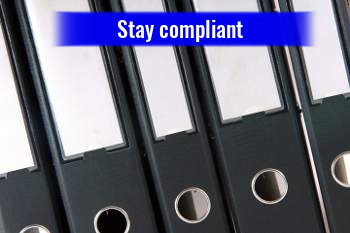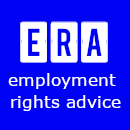The Employment Rights Advice Blog
 Articles, news and updates on employment law in Ireland
Articles, news and updates on employment law in Ireland
for employees and employers
____________________________________________________________________________________________________________________________________________________________________________________________________________________________________________________________________________________________________________________________________________________________________________________________________________________________________________________________
When the Employment Relationship must end
Avoiding the pitfalls
 There are many reasons why the relationship between employer and employee may end. The employee may want to move to a new employer for promotion or relocation reasons. Both parties may agree that it is for the best (resignation).
There are many reasons why the relationship between employer and employee may end. The employee may want to move to a new employer for promotion or relocation reasons. Both parties may agree that it is for the best (resignation).
It may occur as a result of dismissal due to incompetence, redundancy or insolvency.
We look at the issues which arise when ending the working relationship.
What notice must I give?
Both employers and employees are covered under the Minimum Notice and Terms of Employment Acts, 1973 – 2001.
For more details see our article on the minimum notice required in various circumstances.
Dismissal
Great care must be taken when considering the dismissal of an employee. Under the Unfair Dismissals Acts, 1977 to 2005 all dismissals are deemed to be unfair. The onus is on the employer to prove that the dismissal was fair.
For more information see unfair dismissal
See article on gross misconduct here
See article on fair grounds for dismissal here
Redundancy
Remember as an employer, you must consider what position to get rid of in order to improve efficiency. The employee must be selected by fair methods.
More on redundancy
Insolvency
Where the employment has ceased as a result of the insolvency of the employer the employee may be able to obtain payment under the Insolvency Payment Scheme which is operated by the Department of Social Protection.
Under the scheme if the employer is in liquidation, or receivership, or the employer has died or is legally bankrupt that is regarded as an insolvency situation.
More information is available on the Department of Social Protection's website
Where can I get more information?
You can download our short summary
Ending the employment relationship can be fraught with difficulties. If you would like to obtain independent advice from experienced experts please contact us using the orange Tell Me More button below.
Spread the knowledge. If you found this article useful, please like and share using any of the social buttons below.
Employment Law Audit
Avoid being sued or prosecuted
 The day to day demands of running a business can often leave you with little time to carry out a full review of the employment law documents and procedures you use as an employer in Ireland.
The day to day demands of running a business can often leave you with little time to carry out a full review of the employment law documents and procedures you use as an employer in Ireland.
The cost of having the wrong document or procedure can be great. Even something as simple as a job offer letter can create difficulty for you if it is not worded properly. Are your contracts of employment up-to-date? Are you maintaining the correct records for the right length of time?
An employment law full audit will review all of the documents and procedures which you use. You will then be advised of any areas where you may be in breach of current employment law legislation. One of our experienced experts will offer guidance on how to fix any areas which need attention.
We can tailor documents, contracts, procedures, job offers, to suit your individual needs.
With an audit from us, you need not fear an inspection from NERA . or from the Workplace Relations Commission (WRC)
The WRC carry out approximately 5,000 on site inspections annually. With that number of inspections taking place the odds are increasing that you will be inspected. Almost half of the inspections carried out by The Workplace Relations Commission are unannounced. That means they arrive at your door with no advance notice. Take this as advance notice and get a test audit carried out now by our experts and avoid the risk of prosecution.
We can work with you on a regular basis so that changes are embedded in your organisation and policies are kept up-to-date.
An employment law audit is a major step in pro actively reducing the chances of being sued by an employee.
It is better to avoid being sued. Even when you win an employment law case, you are left with the feeling that you have invested a lot of your precious time, defending an action which may have been avoided.
Contact us for more details on our employment law audit for your business.
Use the orange Tell Me More button below. and we will contact you at a suitable time.
Spread the knowledge. If you found this article useful, please like and share using any of the social buttons below.
Employment Records
 What records must I keep as an Employer in Ireland?
What records must I keep as an Employer in Ireland?
Irish employment legislation places an obligation on an employer to maintain the following minimum records:
-
Your employer registration number with the Revenue Commissioners
-
Name, Address and PPS number for each employee
-
The terms of employment for each employee
-
Copies of all payslips
-
Payroll details .e.g. Allowances, gross to net, overtime, shift allowances, commissions, bonuses, etc.
-
Employees Job Classifications
-
Hours of work for each employee. These must be very detailed, and include start and finish times, breaks and rest periods.
-
Commencement date and where applicable termination date, for each employee.
-
A register must be maintained of all employees under 18 years of age .
-
Details of any provision for board and lodgings.
-
Holiday and Public Holiday entitlements taken by each employee.
-
Such documents as may arise under employment rights legislation.
An inspector carrying out an inspection on behalf of the National Employment Rights Authority can request to see all of those records.
What steps should I take to ensure compliance with Irish Employment legislation?
Using the check list below, you should carry out a quick review of the records you hold for each employee.
If you have a full record for each employee, in each category, well done.
If you find that there are some records either missing or not maintained, then you should contact us immediately to discuss how to sort out the problem and put you back in compliance with the law.
Don't put off taking action. If you find yourself the subject of a NERA inspection, you will be glad that you acted now.
We understand that most employers are working under extreme time constraints. That is why you should delegate the task to one of our experienced experts.
Contact us today, using the orange Tell Me More button below, to discuss your Irish Employment law needs, and get the peace of mind that comes from knowing that you are compliant.
Spread the knowledge. If you found this article useful, please like and share using any of the social buttons below.
Disciplinary and Grievance procedures
Getting it right the first time
Every employer in Ireland has a legal obligation to provide each employee with a written copy of the procedures to be followed when dealing with grievances and discipline at work. Under the Unfair Dismissal Acts 1977 to 2007 this must be given within 28 days after entering a contract of employment.
Most employer cases are lost because the employer failed to follow correct procedures when dealing with an employee.
Having an up to date grievance and disciplinary procedures manual is the first step towards ensuring that expensive mistakes are avoided. The second step is making sure that everyone follows the procedures.
Take the time now to implement a good disciplinary procedures policy or waste time and money in a Workplace Relations hearing trying to defend an unfair dismissal claim which could lead to a substantial compensation payment.
What makes a good disciplinary and grievance procedure?
The following attributes are essential to any effective grievance and disciplinary procedure:
-
It must be fair
-
It must be straightforward and avoid ambiguity.
-
The penalties must be clearly stated.
-
An internal appeals system must be laid out in simple steps.
- It must be in a format and language that is easily understood.
Take it in stages
Generally the steps in a disciplinary and grievance process will be progressive.
When a grievance is first raised, the employee should be encouraged to approach their line manager, in the first instance. Consideration should be given to whether the matter can be dealt with informally. After careful investigation it may be the case that a quiet word will help the offending party see the error of their ways.
If the grievance cannot be resolved informally, then it may be necessary to move to a more formal stage in the process, involving the carrying out of a formal investigation, followed by a disciplinary hearing. The results of the hearing should be communicated to the employee concerned without undue delay. The option to appeal the decision must be offered.
Then if requested by the employee, the appeal hearing must be held in a fair manner, in accordance with the procedures manual.
If a decision to penalise the employee is made, this can be implemented at different stages in the disciplinary scale, depending on the seriousness of the offence.
The penalties usually escalate from oral warning, then a written warning, then other penalties such as, suspension, transfer, demotion or dismissal. Where the breach is considered to be serious, the employer can implement the more serious disciplinary action at an earlier stage. For example, you may have to suspend an employee without starting at the oral warning stage.
The benefits of having a good grievance and disciplinary procedure in place
The importance of having fair procedures in place cannot be overemphasised. The benefits include;
- Where fair procedures are in place and are used consistently, employees tend to feel that their input is valued.
- Proper procedures can provide a framework for measuring performance. When performance falls short, to the extent that it creates a grievance, then either the employee or management can raise it, knowing that it will be dealt with in a professional manner.
- When all parties are familiar with the procedures, then problems tend to be sorted out earlier in the grievance cycle.
- A reputation for fair treatment in the workplace leads to excellent industrial relations.
How can I check if the procedure is fair?
We can review your disciplinary and grievance procedure for you at an agreed cost.
We can draft a new policy for you if you need one.
For a free initial consultation contact us using the orange Tell Me More button below.
See article on Natural justice and discipline here
See article on gross misconduct here
Download a copy of the LRC's Grievance and Disciplinary Procedures Booklet,here
Spread the knowledge. If you found this article useful, please like and share using any of the social buttons below.
Latest Employee Blogs
- Performance Improvement Plan or Exit Strategy?
- Whistleblower awarded five years salary by Workplace Relations Commission
- Unlawful COVID-19 pay cut
- Unfair Redundancy Case
- How to raise a problem at work
- Trade Secrets and Whistleblowing
- Is your fixed term contract valid?
- What is it like to bring an unfair dismissal claim?
- Employer relocation
- End of P45
Latest Employer Blogs
- Changes to probationary period
- Redundancy Update
- COVID-19 Vaccination Data in the workplace
- Statutory Sick Pay Scheme
- The Right to Disconnect
- Covid-19 Can I use lay off and short time to cope with Covid-19 ?
- Covid-19 (The Coronavirus) Tips for employers
- Social Media Monitoring in the Workplace
- Using 3rd party CCTV footage
- Do I need a Data Protection Officer ?












